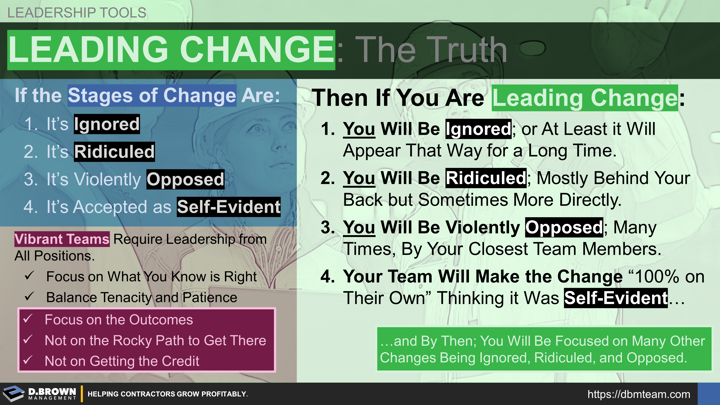Leading change is one of the most challenging things you can do. Prepare yourself mentally and emotionally to be more effective.
In many ways, the rate of change is accelerating within the construction industry. The external rate of change is compounded for a growing contractor navigating the stages of growth, requiring changes to strategy, systems, structure, and often people. Further compounding this problem is the industry's shortage of the most highly experienced talent.
The role of leadership is largely about change management, typically around the different levels of strategic decisions. There is an element of managing change at all levels of the organization including managers, supervisors, and influencers on the frontlines making daily continuous improvements.
There are many models for different stages of change. Many expand on these four basic stages and explore the dynamics of how human nature makes us behave within each of the major stages.
The Four Basic Stages:
- Change is ignored
- Change is ridiculed
- Change is violently opposed
- Change is accepted as self-evident
Reflect back at changes you've seen in your company and in our society as a whole, from electric cars to how different people coped with COVID-19.
If these are the basic stages of change and you are effectively leading change, then here is what you can expect from your career:
- You will be ignored. You will have to repeat yourself 10-20 times. You will have to be creative in how you communicate, ensuring that you not only say the same thing 10-20 times but that you communicate it in 10-20 different ways that are tailored for each person in a manner that is most likely to resonate with them. Remember how communication from leadership is diffused through an organization.
- You will be ridiculed. At first, this will mostly happen behind your back. When this stage begins, you should be excited and celebrate. It means that people are starting to hear the message. Double-down on communicating! Eventually, they will start to ridicule you to your face by making jokes, rolling their eyes, and such. Engage with them at this point because your message is finally getting through.
- You will be violently opposed. This probably won't come in the form of riots. It will likely show up as passive commitment from those closest to you, who will then either slow-play execution or actively do the opposite. This is normal. Dig deep into your leadership toolbox and increase your communication. Work alongside them to help them get through it. Selectively and carefully choose to exert your own power to move things forward, including potentially firing a few people publicly or removing them from their positions. This should be a last resort but is often necessary. Timing must be right and this tactic should only be used 2-3% of the time.
- After months or possibly years of consistent effort on your part, the change will likely be adopted nearly 100%. If you have done this correctly by coaching and developing your team, the cool thing is they will then believe they have done it 100% on their own, that the change was self-evident.
By the time you get to the 4th stage, you will be focused on leading the many other changes that are necessary. You will be back to being ignored, ridiculed, and opposed.
Vibrant teams require leadership from all positions.
As a leader, focus on what you know is right.
- Balance patience, empathy, tenacity, and discipline.
- Focus on the outcomes and celebrate each small milestone achieved as well as "good attempts."
- Focus on small incremental movement in the right direction - GPS Guidance.
- DO NOT focus on the rocky path to get there - the sun will still rise tomorrow. GRIT Matters!
- DO NOT focus on who gets the credit - give the credit to others as much as possible.
You must take a longer view as a leader and get your rewards for looking at what truly has been accomplished. That's why they call them lifetime achievement awards.

